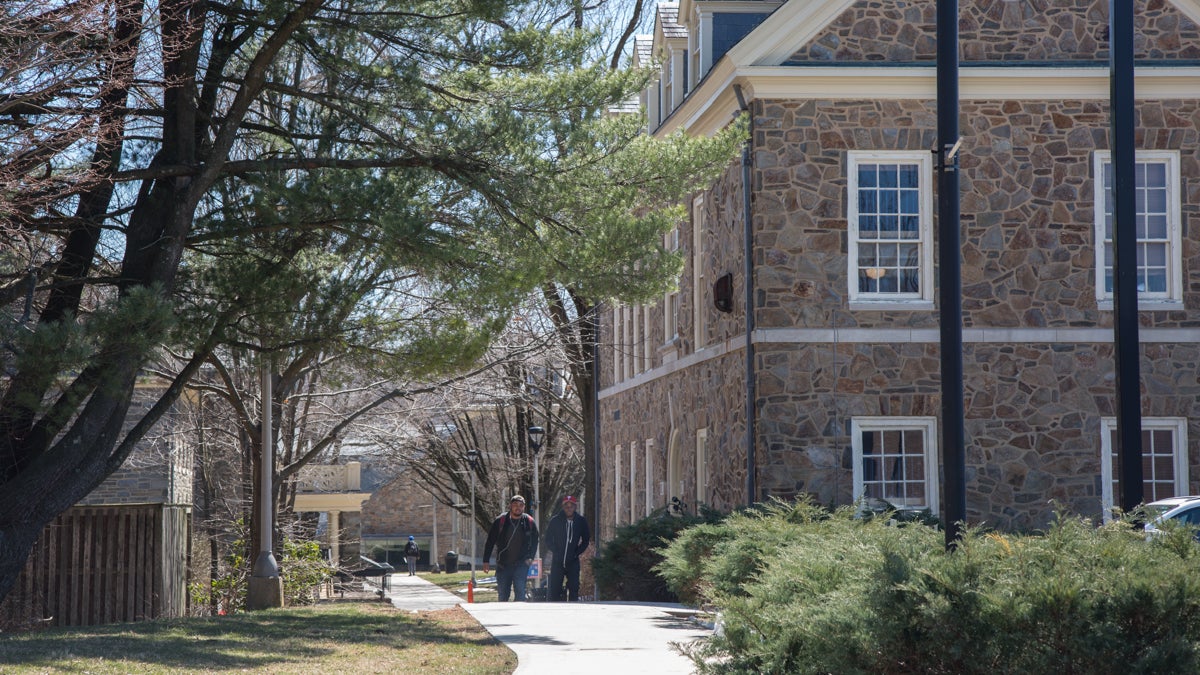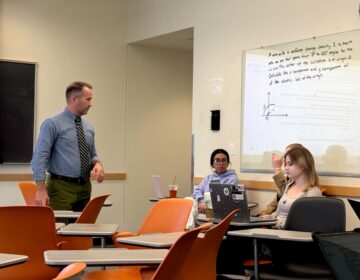Cheyney faculty, students relieved it won’t be merged, but still concerned

Cheyney University (Emily Cohen for NewsWorks)
After a strategic review, a consultant’s final recommendations for Pennsylvania’s 14 state-owned universities will be released at the end of this week. Members of the Cheyney University community are reacting to the initial findings that were already released as they eye other rulings that could affect the university’s fate.
Cheyney — the nation’s oldest historically black college or university — is facing severe financial and enrollment problems and could lose its accreditation. The HBCU has struggled with its lowest enrollment and highest financial debt in the school’s history.
The university has been on accreditation probation since 2015. Last month, the accrediting body Middle States Commission on Higher Education required the school to “show cause” — prove why its accreditation should be not be withdrawn by September. The Commission found Cheyney had not met several standards for accreditation, including financial and institutional resources, planning and administration.
“That’s horrifying from a certain perspective,” said Ivan Turnipseed, Cheyney associate professor and chair of hospitality and recreation management. “I’m hugely concerned they’re going to say, ‘Well in fact, you are no longer accredited,’ which is just like a death knell.”
The National Center on Higher Education Management Systems, the consulting firm that reviewed the 14 schools in the Pennsylvania State System of Higher Education, did not recommend any closings or mergers but called for an overhaul of the state system’s leadership.
Many were worried that Cheyney might be closed or merged with another of the 14 state-funded universities.
“I took that as a sort of vindication and more of a justification for an institution like Cheyney which fills a very specific need and provides incredible access to what currently is an overwhelmingly low-income African-American population,” Turnipseed said.
The hospitality professor says he was hoping though for specific recommendations addressing Cheyney’s immediate financial crisis.
“Cheyney’s situation just can’t be underestimated. I mean literally we’re talking six weeks, a couple of months,” he said of the meetings with the accrediting body. “Is this going to actually work out? Like, this may actually just not work.”
‘Right now, right here’
He says hopes supporters will contribute to keeping Cheyney alive.
“Let’s remember Cheyney is the mother of all HBCUs. It’s the very first of its kind. The only one that was founded decades before the American Civil War.”
Initial advice for the state system also included replacing the current Board of Governors with a Board of Regents made up of people without any political ties; offering buyouts or early retirement options; and appointing a statewide higher ed czar for all colleges and universities in the state.
“Some of those long term changes that were being called for are important and critical, but even more critical is like right now, right here, 2017,” Turnipseed said.
Meghan Sowersby, who will be a junior this fall at Cheyney, says re-examining leadership, like the board, is never a bad thing.
“In order to get representation, I think we really do need people who have the same background or more regular people who have been on the ground, the front lines, those people who really know what the school is from a foundational level. And if we get them [on the board]…to have their opinions and be advocates to students, I think that will only be beneficial.”
Turnipseed is also concerned with what the state is doing to address funding.
“We haven’t even gotten back to the levels of yesteryear. I mean funding is way, way, way, way, way off. It obviously and clearly has a huge impact on the entire state system,” he said.
Ken Mash, president of the system’s faculty union, agrees.
“Our concern remains that moving the deck chairs on a sinking ship is not necessarily the only answer that’s there,” he said. “Ultimately this Commonwealth has to make a decision about whether college is going to be affordable.”
Pennsylvania ranks 46 out of 50 states in per-student funding for public higher education.
Mash says the state-owned universities are not as affordable as they should be — and won’t be without a commitment from the state. To make up for loss revenue, tuition has continued to rise, including a 3.5 percent hike for the coming school year.
“The private universities are competitive cost-wise with our universities. We’re supposed to be the universities that serves the working class,” Mash said.
Sowersby, a communication major, says she was happy there were no closures or mergers recommended but says the situation still feels prickly with unanswered questions about enrollment, funding and graduation rates at all the schools.
“I’m glad none are closing, but I’m still waiting to see how we’re going to deal with remaining problems.”
Separate from the strategic review, a state-appointed task force recently recommended a new institutional model for Cheyney University. Those recommendations include creating the Institute for the Contemporary African-American Experience; scaling majors down from 17 to 12; eliminating its NCAA Division II athletic programs; and conducting a feasibility study on selling or leasing part of Cheyney’s 275 acres.
“I’m not against any of them,” said Sowersby of the task force recommendations. “I think that in order to get out of this hole, we are going to have to make some changes to get our revenue up and just to kind of turn the tide.”
The 20-year-old says looking into leasing some of Cheyney’s land is a great idea and would bring more people to Cheyney’s bucolic campus.
“Cheyney is a huge beautiful school with a lot of open space,” the Delaware County native said. “A lot of this land is really going untouched and unused. And it makes the campus really, really gorgeous, but it can also serve a purpose and make us some money.”
Turnipseed says he worries the state system doesn’t have any plans for Cheyney.
“There’s always that lingering fear for me in the background that in fact there isn’t one because in fact you have no interest in sustaining Cheyney,” he said. “You want it to be Middle States who says, ‘This isn’t working. We’re pulling our accreditation,’ so that you can just have West Chester come in and just make this an annex campus or something. That’s what you want.”
The tenured professor says he is not concerned for himself but for his students.
“There are other places that I can work,” he said. “What’s going to happen in the next several weeks that’s going to change this picture and really reinvigorate the institution? Something has to be very, very different.”
State lawmakers are also conducting a study and issuing a report on the sustainability and viability of the state system due by the end of the year.
Sowersby, a Keystone Honors Academy scholar, remains optimistic.
“I really see a bright future for Cheyney because I see a lot of potential,” she said. “These changes are necessary. Institutions need to go through changes. They need to revamp processes and improve themselves if they’re in any sort of situation. Like most people, I’m waiting with bated breath, trying to wait it out and see what happens.”
WHYY is your source for fact-based, in-depth journalism and information. As a nonprofit organization, we rely on financial support from readers like you. Please give today.




